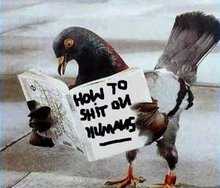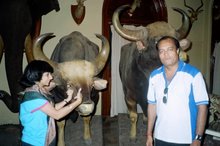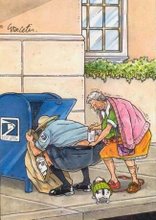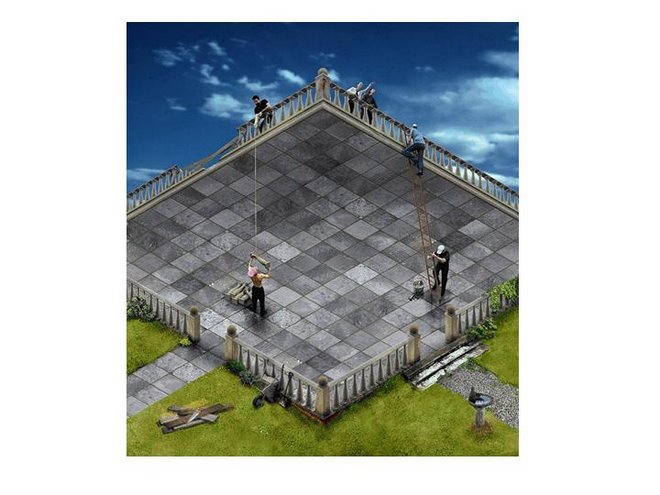Saturday, June 23, 2007
What's in a name?
In one Turkish village any letter addressed to Mustafa Baysal - a name shared by 42 of the 342 villagers - is opened and read aloud in the village square before being turned over to its proper recipient. The local headman, himself a Mustafa Baysal, says the problem of telephone calls has not yet been solved. When a call for one Mustafa Baysal comes in at the local Post Office, which has the only telephone in the village, all Mustafas line up at the phone to see which of them the call is for.
Too many sevens
Anthony Clancy of Dublin, Ireland was born on the seventh day of the week, seventh day of the month, seventh day of the year, seventh year of the last century, was the seventh child of a seventh chilld and had seven brothers: that makes seven sevens. On his 27th birthday, when Clancy looked at a race card to pick a winner in the seventh race, the horse numbered seven was called Seventh Heaven with a handicap of seven stone. The odds were seven to one. Clancy put seven shillings on this horse to win. The horse finished seventh.
High on ketchup
Swedes are the biggest users of ketchup, spending $4 a year on it. Australians are second with $2.50 spent on ketchup each year. Americans and Canadians who spend $2.20 a year of ketchup are third. Others include Britons ($1.60), Poles and Japanese ($1.40), French ($1.20) and Russians ($0.90).
Without a bath
The era of the Middle Ages has been referred to as "1,000 years without a bath." Bathing was rare in Europe at that time, largely because the Christian Church considered it a sin to expose the body, even to oneself.
It was not until 1641 that soap was manufactured in England. Religion had become less oppressive, but government harassment in the form of restrictions and taxes on the soap-making industry caused the soap business to develop slowly.
It was not until 1641 that soap was manufactured in England. Religion had become less oppressive, but government harassment in the form of restrictions and taxes on the soap-making industry caused the soap business to develop slowly.
Which came first, the screw or the screwdriver?
The screw, surely? No - it was the other way round. Screws as we know them didn't catch on until about 150 years ago. That was when a method of making them cheaply by machine was invented. Until then the few wood screws that were in use did not have points. However, carpenters had been knocking nails into wood for hundreds of years. As long ago as the sixteenth century it was discovered that giving a nail a twist helped tighten it. In the same way, cutting a slot in the head of the nail so that it could be twisted in the other direction was the only way of getting a nail out. In both cases a tool with a short, blunt blade was used. It looked a bit crude, but it was a screwdriver all the same.
Tragic coincidence
Antonio Ascari, the greatest Italian racing car driver of his age, was killed in 1925 at the age of 36 when his car skidded and crashed for no apparent reason. He had not been wearing his lucky blue helmet.
His son, Alberto, also a champion, was killed in 1955 when his car skidded and crashed - again for no apparent reason. Like his father, he was 36 years old - and had not been wearing his lucky helmet!
His son, Alberto, also a champion, was killed in 1955 when his car skidded and crashed - again for no apparent reason. Like his father, he was 36 years old - and had not been wearing his lucky helmet!
Unique missiles
In the early days of World War-1, French airmen carried bags of bricks in their planes. Machine-guns were not then in use, since the problem of firing through the propeller had not yet been solved. The French tried to bring down German planes by throwing bricks into their propellers - and two planes are recorded as having been destroyed in this way.
The oldest language still in use
The oldest language still in use in the world is the language employed by the Indian mahout - the professional elephant driver and keeper. In addressing the elephant the mahout uses neither Hindi nor Arabic nor Persian. Instead, he employs the tongue of the caveman - with which the latter first tamed an elephant 50,000 years ago. This survival - one of the most astounding in history - of a language of the caveman era furnishes some basis for the traditional and famous elephant memory, since the animal still refuses to understand any other tongue.
Nostradamus predicted his own death.....and even beyond!
Nostradamus was a 16th century Frenchman who could, apparantly, predict the future. In his writings, he forwarned many disasters such as the Great Fire of London in 1666, the rise of Hitler and the Second World War.
Nostradamus even predicted his own death in 1566. Before he died he went to an engraver and asked him to engrave a date on a small metal plate. He then instructed the engraver that the engraved plate should be placed in his coffin.
In the year 1700 it was decided to move the coffin from the grave where it had lain for more that 134 years to a more prominent site. Before it was lowered into the earth the coffin was opened. Inside the coffin a metal plate was found bearing the date 1700.
Nostradamus even predicted his own death in 1566. Before he died he went to an engraver and asked him to engrave a date on a small metal plate. He then instructed the engraver that the engraved plate should be placed in his coffin.
In the year 1700 it was decided to move the coffin from the grave where it had lain for more that 134 years to a more prominent site. Before it was lowered into the earth the coffin was opened. Inside the coffin a metal plate was found bearing the date 1700.
Laid back film...
Andy Warhol was a famous American artist who came up with some very famous pictures - and some really boring films. One of his movies, "SLEEP", lasts for eight hours and shows nothing more than (you guessed it) one person sleeping!
Subscribe to:
Comments (Atom)

















